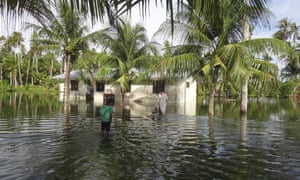Extract from The Guardian
Andrew SimmsWith a reality TV demagogue in power, it’s crucial that we find a story in which people can discern a better future
A woman and a child walk through water to reach their home during a king tide event on Kili in the Marshall Islands, that are just two meters above sea level in most places. Photograph: AP
Contact author
@andrewsimms_uk
Wednesday 23 November 2016 21.26 AEDT
Two months and counting
Climate change is like the type of film director who, having already thrown the audience into seemingly inescapable peril, keeps piling on the jeopardy. The carbon budget to stay below the Paris climate accord’s target of 1.5C of warming is all but used up, and staying below even its lower goal of 2C now requires elaborate leaps of faith.While signatories to that agreement make decisions on national infrastructure in direct contradiction to it, the most powerful economy on Earth falls under the spell of a reality TV demagogue, at best uninterested in the issue and at worst determined to promote the industries and energy choices that will make the problem catastrophic.
We need to find a new way to engage when the highest power is won on policies picked by a snake oil salesman who’s promised with a nod and a shrug to solve the nation’s problems. On everything from climate change, to the EU and international cooperation needed for action, our reality is being shaped by people who tell tales with plot holes, continuity errors and no regard for factual grounding.
Those who care about these issues must learn to tell better tales. Yet there’s a problem. The presentation of evidence, sober argument and the appeal to reason is deeply engrained in the culture of campaigning for progressive change. Other approaches tend to leave advocates feeling insecure, suspicious or lacking confidence.
But this is what Philip Pullman, one of our greatest storytellers, has to say in the foreword for a new collection of modern folk tales for troubling times, ‘There was a knock at the door...’:
Stories are one of the most ancient and most effective ways of making sense of the world. There are some very stern people who think that stories can’t be important or useful because they’re only ‘made up’. How wrong that is! The human imagination is profoundly important, and when it turns to exploring the problems we human beings find when we try to live a good life in a world we seem to be simultaneously destroying, there is nothing more valuable or worth encouraging.The collection opens, appropriately with a tale by the poet Jan Dean, called The Magician. In it, the promise of an easy life is made to a young woman in return for simply lighting the fires in the magician’s house each day for a year. But each day the house and fires grow, the task becomes impossible and the world beyond is gradually consumed.
I recently heard of an academic who has taken to challenging his students when they propose responses to climate change with the question: ‘but is this a 1.5C solution, or a 2C, 3C or 4C answer?’ It’s a good question and one that should be put to every policy proposal to see if it is part of hauling the world back from the current climate brink. Of course, the actual number above about 2C becomes slightly immaterial, as beyond this level there’s no guarantee of stabilising temperature rise (and many argue that to be the case at 2C as well, which is why the lower 1.5C figure appears in the Paris accord).
Whatever tale we come up with, it will have to be one of rapid transition. Last weekend I took the slow train from London to Uppsala in Sweden, wherewe are working with the climate scientist Prof Kevin Anderson and his Swedish university colleagues to explore current and historical examples of rapid transition in our energy use, infrastructure, cultural norms and behaviour.
We hope, alongside other related work to end up better able to understand and describe the conditions in which rapid, progressive change occurs. And with that, allow people to imagine such change and help remove resistance to it. The work will be evidence-based, analytical and factual. But that will not be enough.
We will also have to find a better story to tell, in which people can discern a better future and answers to a host of social and economic problems. It will have to be a tale people can believe in and will want to read to the end.
On the journey to Sweden, at one point the train leaves the land and goes physically on to a ferry boat. Unusual and surprising as that is, then there’s a moment when you’re poised between the sheltering harbour and the vast horizon of an uncontrollable sea. This is the point where our story might begin.

No comments:
Post a Comment